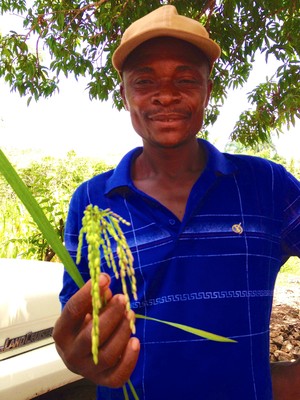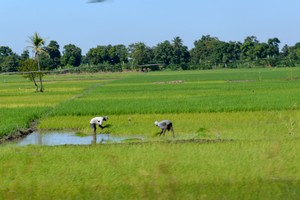Rice Imports Cause Harm in Haiti
By Cindy Corell, Mission Co-worker, FONDAMA, Joining Hands Haiti
March 7, 2016

Andre Ceus of Chevaux, Haiti, holding newly harvested rice. Photo Credit: Cindy Corell.
In a mountaintop community called Chevaux, in Haiti, just about everyone tends to the rice crop. A shallow river is blocked off with large rocks in about 10-foot squares.
The flowing cool water feeds the rice beds for two crops a year — one in the spring and another harvested in the fall. Out of season in those same watery beds, the community plants and tends watercress.
It’s good rice — long grain and tasty. The problem is that if the farmers were to sell it outside the Artibonite Valley, the local rice would compete with an imported, lower quality version at half its price.
Most Haitians, who live on less than $2 a day, can only purchase “Miami rice,” grain imported from the United States.
For what it’s worth, former President Bill Clinton apologized. In fact, he later called U.S. policy pushing rice imports on Haiti the “Devil’s bargain.”
In spite of all the obstacles facing Haitian farmers, after more than 30 years, those policies and the gigantic influx of foreign food into the poor developing country continues to plague the Haitian people.
The importing of foreign food into Haiti is a root cause of poverty here, and that’s why the executive committee of FONDAMA, the Joining Hands network in Haiti, has identified it as the focus of its advocacy campaign for 2016 and is aligning with other advocacy networks and platforms fighting the same battle.
Haitians are currently coping with a severe drought that could, if not relieved with steady rains by July, leave 5 million people, about half the country’s population, facing severe hunger. And millet, which is Haiti’s prominent cereal, has been destroyed by pests, further damaging the small country’s food situation.
But underlying many of the issues facing Haitian farmers and accentuating the country’s long-lasting hunger problem is the issue of artificially cheap American rice imports, a problem since the early 1990s.
Until the 1980s, Haiti’s farmers were growing enough food to feed the country. In 1985, millet and other cereals made up 22 percent of the average Haitian’s diet.
But more wealthy countries changed their policies in the early 1980s, as former President Clinton said in March 2010.

Rice workers in the Artibonite Valley. Photo Credit: Cindy Corell.
Speaking before the Senate Foreign Relations Committee, Clinton explained that the policy import more food into Haiti would encourage the poorer country to transform into an industrial nation.
“Since 1981, the United States has followed a policy, until the last year or so when we started rethinking it, that we rich countries that produce a lot of food should sell it to poor countries and relieve them of the burden of producing their own food, so, thank goodness, they can leap directly into the industrial era,” Clinton said.
The result was that the imported rice, heavily subsidized by the U.S. government, severely harmed rice production by undercutting the Haitian farmers’ ability to compete in the markets. The dramatic increase in availability of cheap rice also changed the country’s diet.
According to the United Nations Food and Agriculture Organization, in 1985, rice was 7 percent of the daily caloric intake for people in Haiti. But by 2011, rice had more the doubled — 23 percent of daily caloric intake — in the average Haitian diet.
And while the local rice production has struggled to survive during this time, the amount of rice imported has nearly quintupled.
“It may have been good for some of my farmers in Arkansas, but it has not worked,” Clinton told the Senate Foreign Relations Committee in 2010.
“I have to live every day with the consequence of the lost capacity to produce a rice crop in Haiti to feed those people, because of what I did.”

